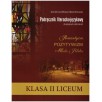GCSE and A-level exams in Polish as a foreign language in the UK
The opportunity to choose Polish as one of the foreign languages in the UK is a privilege and an opportunity for students. If you don't know about it, Dear Parent and Teacher, read on! We will also tell you what exam materials you can purchase in our bookstore to prepare for GCSE and A-levels.
What is GCSE and why is it an opportunity to take GCSE Polish in the UK?
Great Britain is one of the few countries that allows students to choose Polish for the GCSE exam, the General Certificate of Secondary Education (no equivalent in Poland - compared to the eighth grade exam, but of much greater value, an exam important when applying for jobs) and A -level (equivalent to the Matura exam in Poland).
This should not be surprising, mainly because Polish is the dominant foreign language used by the UK population, which, however, does not mean that it would have to appear on the list of languages that students from secondary schools can choose from. And yet it is! And this is what Poles in the UK should perceive as a privilege. The results of these exams are treated on equal terms with other languages taught in schools, such as Spanish, French, German or Italian.
What are the benefits of taking GCSE and A-level exams in Polish as a foreign language?
The list of all the answers to this question would be long, so let's focus on the most important five that most often appear in the context of educational and professional paths.
1. Better university prospects
It is undoubtedly to your credit, Dear Parent, that your child has been given the opportunity to learn Polish at home. If you communicate with your child in Polish, you have managed to give your child the opportunity to develop Polish not only for everyday communication at home, but also for university purposes.
If your child reaches A-level, this exam result will add a certain number of points to the recruitment process for studies in Great Britain (the higher the result, the more points!). Even for fields where a foreign language does not play a leading role, the result from Polish may enrich the so-called 'personal statement' of the candidate or be a lifeline during recruitment if the results in other subjects turn out to be lower than expected.
From my own experience, I can give the example of my son, who failed in his maths exam. His final result was lower than expected - by as much as two grades, so the previous offers - pre-accepting him as a future student of a given university ('conditional offers') - became invalid. My son was among the candidates taking advantage of supplementary recruitment. Fortunately, there were universities that accepted Gustaw's additional credits in a foreign language and my son could start studies in his chosen field (computer animation).
2. FOR PARENTS RETURNING TO POLAND.
Of course taking Polish language exams will also be a helpful path if the student wants to return to the country. There is no clear translation here in the formal sense, i.e. the A-level exam in Polish as a foreign language does not translate into the result of the Matura exam in Polish in the country - this is one of the aspects that parents often do not understand, and its important to appreciate the differences.
Your teenager will have passed Polish as a foreign language. This result can be treated as confirmation of certain basic skills in understanding and communicating in this language. It is certainly better to have this result than to have no confirmation of language knowledge.
The same principle applies to GCSE examinations. If a 14- or 15-year-old child moves to Poland and continues his/her education in the national system, passing the GCSE exam will be a signal that the student communicates in Polish.
3. Career paths
The third argument encouraging taking the Polish GCSE exam refers to the professional environment. Knowledge of foreign languages is a competence valued in many industries.
I will give an example that I know from the place where I lived for 12 years, i.e. the area around London Gatwick airport (although it is not difficult to apply the principle to other industries that will not be included in my example). In my region, the tourism industries dominated, offering transport services (airplanes, a network of buses, buses and trains), hotels (employing a total of several thousands of employees) and restaurants.
The white and red symbol on the pin of a receptionist, waitress or driver, proving the ability to communicate in Polish, increases the value of a given employee (previously a job candidate). It works the same at higher levels - at work, where, for example, people's work is managed. There are so many people with Polish as their dominant language among the employees! Certainly, a manager who can communicate in their native language will have greater employment opportunities than a person without knowledge of one or another language.
4. Second language
In British schools (as well as in Poland and other countries around the world), students have to learn a foreign language. This process begins in primary school, where the most frequently taught languages are French and Spanish. In post-primary school, this obligation continues - students still learn foreign languages and choose at least one of them as options at GCSE level.
Let me give you a real-life example again - my son did not have the opportunity to choose a foreign language. The French language was imposed on him, which he had not learned before. The current and predicted results of the possible French exam did not look good. In his case, it was the school that took the initiative for his son to take GCSE exams in Polish instead of struggling with French. Honestly, as a mother, I had no idea that this was possible. But of course, my son took Polish and passed it with the highest grades, which encouraged him and took away the stress associated with French lessons.
You can also take two languages - choosing Polish does not mean giving up another foreign language. Preparation for Polish exams will probably be less demanding than preparation for another language. Spanish or French may be a more difficult foreign language for a student if he or she does not use it in a natural family setting.
5. Family and friends in Poland
The chance to maintain the language through communication with family and friends in Poland is extremely important for many parents. By cultivating the Polish language in children raised abroad, we give them the opportunity to communicate with their families in Poland. In addition, we provide them with rich cultural and historical heritage, which they can use, for example, by visiting Poland.
What difficulties may arise for candidates taking the Polish GCSE exam in the UK?
The main difficulty for students who want to take Polish as a foreign language is that it is not a language commonly taught in British schools. There are, of course, exceptions - there are individual schools where Polish is included in the course of classes. However, most students have to look elsewhere for help.
Preparation for GCSE exams is offered by Polish Saturday schools. A-level exam class may be more difficult to find. The main reason is staffing problems - firstly, there is generally a lack of people willing to work in Saturday schools, and secondly, there are few teachers prepared to work at A-level.
Many students use the help of tutors who conduct classes traditionally or online.
You can also prepare on your own, which requires the student (and parent) to have extensive knowledge of the requirements and great work discipline. Educational materials available on the market may be of great help here:
GCSE in Polish preparation materials
See all GCSE in Polish materials
Materials preparing for the A-level exam
See all A-level in Polish materials
The series "Zeszyty Szkolne. A-level"
Zeszyty Szkolne. A-level, Nr 1
Zeszyty Szkolne. A-level, Nr 2
Zeszyty Szkolne. A-level, Nr 3
Zeszyty szkolne, A-level, nr 4
Zeszyty szkolne Nr 4 – pdf version
Zeszyty szkolne Nr 5 – pdf version
The second difficulty is the selection of an examination centre. Most British schools - although they do not offer Polish language learning - allow you to take Polish exams.
To be sure that this is possible, it is best to register your desire to take the exam in the language department of a British school in autumn. Then the student or parent will immediately receive an answer whether it is possible.
Sometimes several local schools in one region make arrangements with each other and organise the possibility of taking Polish exams in one of the institutions. Sometimes such an opportunity is missing because, for example, there are too few candidates willing to take the Polish exam. Then you should look for an examination centre that accepts private candidates. It is best to use the search engine on the AQA website.
The only Polish examination center is run by Polska Macierz Szkolna.
You should take into account an additional examination fee charged by a given centre, the amount of which may vary.
Attention to parents in Scotland!
Despite the educational system being slightly different than in England, it is possible to take GCSE and A-level exams in Scotland. You just need to find a testing centre that offers these exams. High school graduates in particular can benefit from this, because Scottish universities also accept points from the Polish A-level.
What are the requirements for GCSE and A-level Polish language exams in the UK?
The first competence in communication tested in the exam is LISTENING.
Listening, or listening with understanding, is a skill tested at GCSE and A-level. The test in this part involves listening to recordings in Polish and answering questions about these recordings.
At GCSE, the recordings are short and refer to everyday situations.
It's a bit more difficult in the high school leaving exam, because the scope expands to include topics beyond everyday situations (e.g. art, politics, social issues).
After listening, it's time to speak. Students' statements are tested for understanding and grammar skills only at GCSE.
Another important skill is reading comprehension. Reading appears as a separate test at GCSE - students answer questions on short texts.
In the A-level exam, reading comprehension is needed in each of the three parts of the exam. In paper 1, the student answers test questions, just like in GCSE, although of course they are more difficult than in the previous exam - high school graduates are required to understand not only literal, but contextual and figurative understanding.
It is impossible to pass the A-level exam paper 2 without prior work with literary texts! The list of readings to choose from is very short, but work with the selected text should be reliable, based on details and extended to include the required historical or cultural contexts.
The student will ultimately provide evidence of understanding the texts in writing. Writing is needed not only on the reading and film sheet 2, but also on the final exam sheets 1 and 3. In sheet 1, the student will have a text to summarise and an essay on the selected topic of the research project. In sheet 3, in addition to a summary of the text listened to, there will also be an essay based on the material listened to and read by the high school graduate (multiskill task).
GCSE requires quite short written forms (from four sentences to 150 words) on topics close to the student's experience.
Translation skills are also important in both exams (GCSE and A-level). Students are given sentences or continuous texts to translate both from Polish to English and from English to Polish.

































 GCSE and A-level exams in Polish as a foreign language in the UK
GCSE and A-level exams in Polish as a foreign language in the UK
 Meet the author, Adam Beck
Meet the author, Adam Beck






















Anna
2021-09-02 13:20:12
Bardzo pomocne materiały. Super artykuł